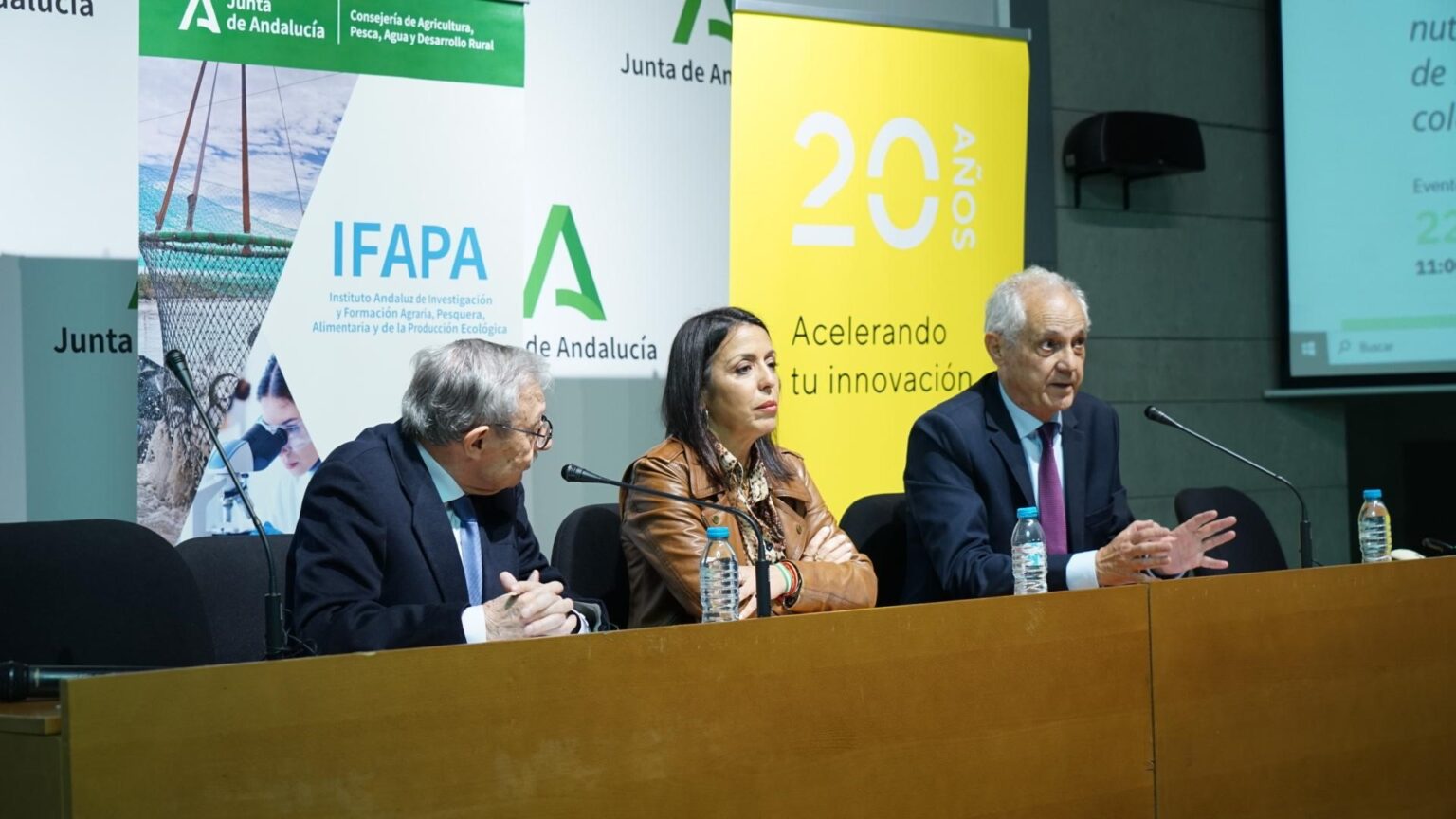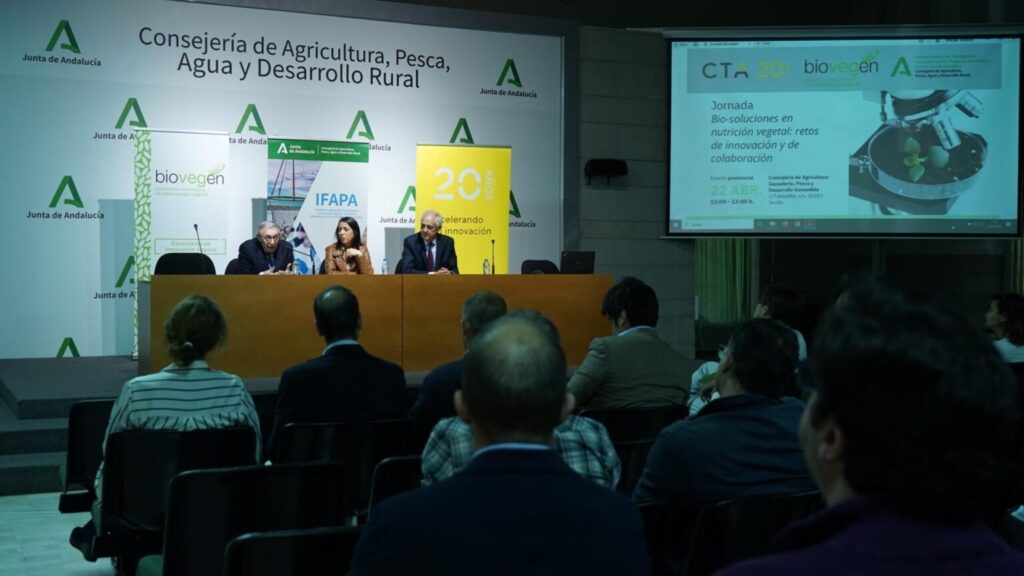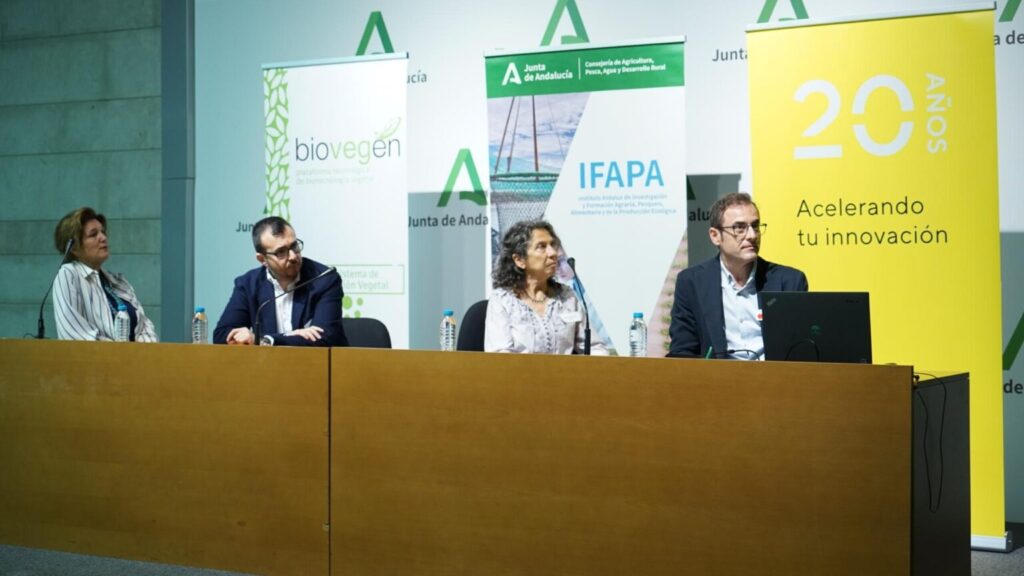More than 60 agri-food entities meet in Seville to learn about biosolutions in plant nutrition.

- IFAPA, CTA, and BIOVEGEN organized this meeting to promote innovative solutions and foster a space for debate on sustainable and efficient biofertilization.
The president of the Andalusian Institute for Research and Training in Agriculture, Fisheries, Food, and Organic Production (IFAPA), Marta Bosquet, the general director of the Andalusian Technology Corporation (CTA), Elías Atienza, and the president of the Plant Biotechnology Technology Platform (BIOVEGEN), José Pellicer, inaugurated the conference yesterday in Seville “Bio-Solutions in Plant Nutrition: Challenges of Innovation and Collaboration.”
This meeting, which was attended by representatives of companies, research centers and key players in the agri-food sector, It aimed to promote the development of innovative solutions in plant nutrition, as well as fostering a space for debate to share knowledge and experiences in the search for more sustainable and efficient strategies in the field of biofertilization.
“This activity is an opportunity to boost competitiveness "of our agricultural sector through public-private collaboration," emphasized Marta Bosquet, who praised the commitment to research and experimentation from the Andalusian Regional Government. "Potential biosolutions in plant nutrition are very important for achieving more sustainable, profitable, resilient, and environmentally friendly crops."

The general director of CTA, Elías Atienza, highlighted that “biofertilization is a current topic in the context of the green transition and decarbonization of agriculture which is being promoted by the CAP and entails technical challenges that require a significant effort in R&D&I for its resolution." In this sense, he pointed out that the scientific-business cooperation to address them and offered advice and support CTA incentive program for innovative projects that arise in this field of biosolutions in plant nutrition.
For his part, José Pellicer stressed the importance of these days that "allow us to know the advances, technologies that productive structures and expectations are changing,” he said, also highlighting the importance of “uniting companies and people to keep up with technological advances.”
The event, which brought together 60 industry professionals, featured several expert presentations and a roundtable discussion. Pablo Quirós, head of R&D&I projects at Fertinagro, addressed the challenges of biofertilization, while Javier López, technician of the R&D&I department of DCOOP, dealt with the Technological needs of biofertilization in the agri-food sector, especially the case of the Simbioliva Operational Group.

For their part, the experts at the round table held during the day debated on the technological offering and innovative solutions in plant nutritionSpecifically, the event featured Vicente Mariscal, researcher at IBVF-CSIC; María Camacho, researcher at Ifapa; Joaquín Pozo, R&D director at Biorizon Biotech; and Berta Rodríguez, scientific coordinator of TIMAC AGRO.
The meeting, held at the facilities of the Ministry of Agriculture, Livestock, Fisheries and Sustainable Development, also allowed participants to hold bilateral meetings between suppliers and demanders of biotechnology in previously scheduled meetings, which took place in various spaces of networking enabled during the activity.
Innovation in the agri-food sector
This conference for collaboration and innovation in biosolutions for plant nutrition, organized by CTA, IFAPA, and BIOVEGEN, represents an opportunity to strengthen science-business collaboration, promote technological development, and exchange ideas.
IFAPA It is a public research organization attached to the Ministry of Agriculture, Fisheries, Water and Rural Development. Its objective is to contribute to the modernization of the agricultural, fishing, and food sectors in Andalusia and to the improvement of their competitiveness through research, technological development, knowledge transfer, and training, while also ensuring environmental sustainability. To this end, the institute has 15 centers spread across all Andalusian provinces, totaling more than 1,300 hectares of experimental land and numerous unique facilities. In total, eight scientific and technical areas make up a research and training structure in the region that seeks to respond to the demands of the sector and provide the necessary advice that will result in the improvement of its production systems.
CTA CTA is a private foundation with more than 185 member companies and over 20 years of experience. It was originally promoted by the Regional Government of Andalusia (Regional Government of Andalusia), is privately managed, and is dedicated to promoting regional R&D&I and technology transfer. CTA helps companies, universities, technology centers, public administrations, and other entities maximize their R&D&I efforts. CTA also advises companies on planning an innovation strategy, from identifying their R&D&I needs to formulating projects to address them, and finding partners and the funding necessary to carry them out. It also has a growing international presence as a leading partner in collaborative innovation projects, having participated in more than 65 international projects and collaborated with more than 500 entities from 45 countries.
BIOVEGEN is a public-private partnership, led by the business sector, that brings together entities from the agri-food sector interested in plant innovation. Public research organizations, administrations, and companies from the agri-food sector participate in this initiative, including plant breeders, plant fertilization and nutrition, plant protection, agricultural biotechnology, and R&D management. BIOVEGEN's objective is to improve the competitiveness of the Spanish agri-food sector by incorporating new technologies based on plant biology. To this end, they work to generate joint public-private R&D projects, promote greater knowledge and technology transfer to the business sector, contribute to the design of R&D strategies tailored to the agri-food sector, and promote greater public and private investment in R&D.
